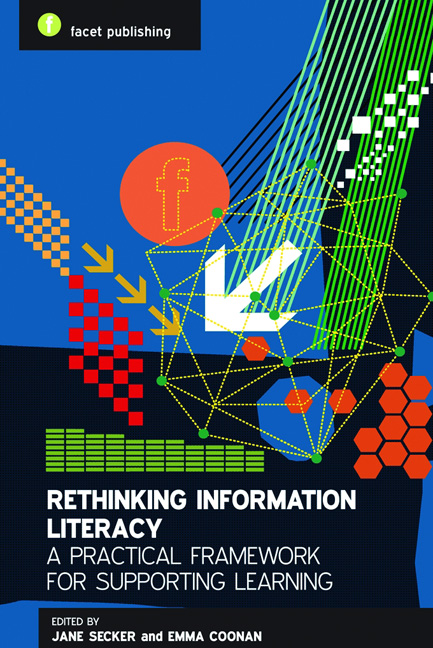Book contents
- Frontmatter
- Contents
- Acknowledgements
- Contributor profiles
- Introduction
- Strand One Transition from school to higher education
- Strand Two Becoming an independent learner
- Strand Three Developing academic literacies
- Strand Four Mapping and evaluating the information landscape
- Strand Five Resource discovery in your discipline
- Strand Six Managing information
- Strand Seven The ethical dimension of information
- Strand Eight Presenting and communicating knowledge
- Strand Nine Synthesizing information and creating new knowledge
- Strand Ten The social dimension of information
- Afterword: ‘Ownership is a flawed concept’
- Conclusion
- Appendix 1 A New Curriculum for Information Literacy (ANCIL): the curriculum
- Appendix 2 ANCIL Lesson Plan
- Appendix 3 ANCIL Institutional Audit: worksheet
- Appendix 4 ANCIL Institutional Audit: interview questions
- Index
- Miscellaneous Endmatter
- Miscellaneous Endmatter
- Miscellaneous Endmatter
- Miscellaneous Endmatter
Afterword: ‘Ownership is a flawed concept’
Published online by Cambridge University Press: 08 June 2018
- Frontmatter
- Contents
- Acknowledgements
- Contributor profiles
- Introduction
- Strand One Transition from school to higher education
- Strand Two Becoming an independent learner
- Strand Three Developing academic literacies
- Strand Four Mapping and evaluating the information landscape
- Strand Five Resource discovery in your discipline
- Strand Six Managing information
- Strand Seven The ethical dimension of information
- Strand Eight Presenting and communicating knowledge
- Strand Nine Synthesizing information and creating new knowledge
- Strand Ten The social dimension of information
- Afterword: ‘Ownership is a flawed concept’
- Conclusion
- Appendix 1 A New Curriculum for Information Literacy (ANCIL): the curriculum
- Appendix 2 ANCIL Lesson Plan
- Appendix 3 ANCIL Institutional Audit: worksheet
- Appendix 4 ANCIL Institutional Audit: interview questions
- Index
- Miscellaneous Endmatter
- Miscellaneous Endmatter
- Miscellaneous Endmatter
- Miscellaneous Endmatter
Summary
Implementing the curriculum was the natural next phase after the creation and publication of ANCIL. The subsequent Arcadia Programme project, Strategies for Implementing ANCIL,1 had two separate but complementary strands, one a 12-week project examining methods of implementing ANCIL within the University of Cambridge, and the other a 10-week project investigating strategies within non-Cambridge higher education institutions (HEIs). The focus of this latter investigation of potential strategies within non-Cambridge HEIs was to identify existing provision of information literacy teaching and find out which members of staff are involved in the delivery.
Information literacy has long been believed to be primarily the domain of academic librarians. In 1999 the SCONUL Information Skills Taskforce echoed Biddiscombe's (1999) assertion that ‘There are few academic library services that do not now regard the teaching of information skills as an important part of their mission’, arguing that:
This is evident from recent trends of activity in this area of work, identified from data supplied by the Library and Information Statistics Unit at Loughborough University. The average number of hours spent by library staff providing orientation and post-orientation for students in SCONUL institutions has increased over the last six years from 13 hours to 22 (per 100 full time equivalent students).
SCONUL (1999, 7)The SCONUL research revealed some variations, and showed that in new universities library staff spent more time teaching – increasing over the previous six years 1993–1999 from 22 to 28 hours – whereas the research-led universities tended to spend less time on teaching (the figures were 6 to 17 hours). The report concluded that, despite the variation in time spent, the trend was clearly increasing overall: the ‘number of users receiving orientation or post-orientation sessions is increasing overall from 36% to 46%, while appearing to be constant in the “new” universities at 60%’ (SCONUL, 1999, 7).
Information literacy teaching has developed considerably since SCONUL first launched its Seven Pillars of Information Literacy. There is also a growing understanding that:
Librarians alone can not provide an effective information literacy program for the entire student body on campus. When departmental faculty and librarians share the responsibility for the information literacy program, it can be implemented with a more coherent and systematic approach throughout the campus ….
- Type
- Chapter
- Information
- Rethinking Information LiteracyA practical framework for supporting learning, pp. 131 - 140Publisher: FacetPrint publication year: 2012



